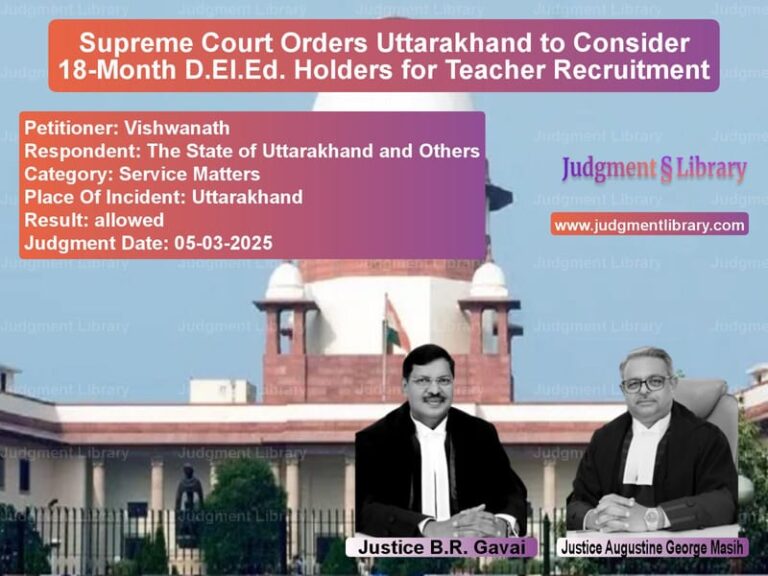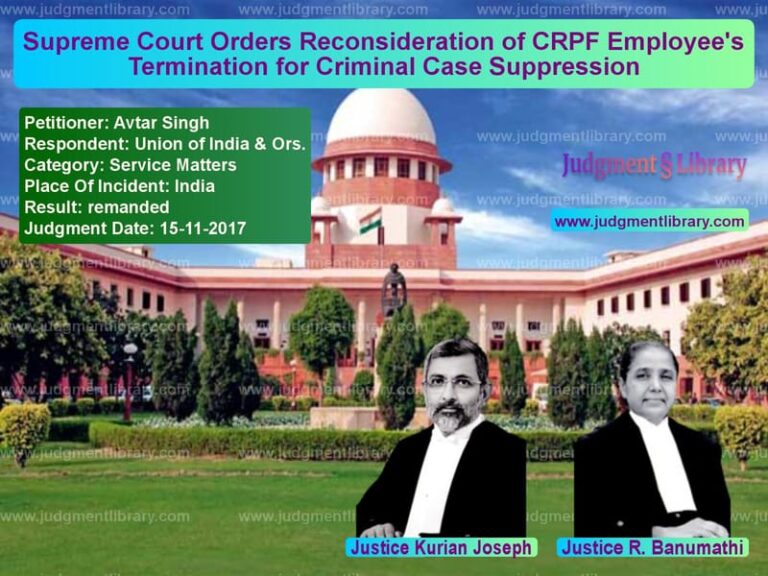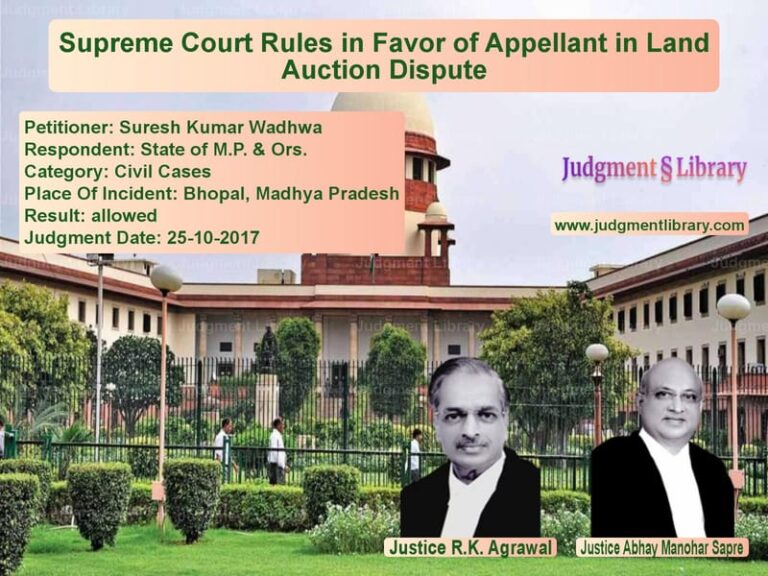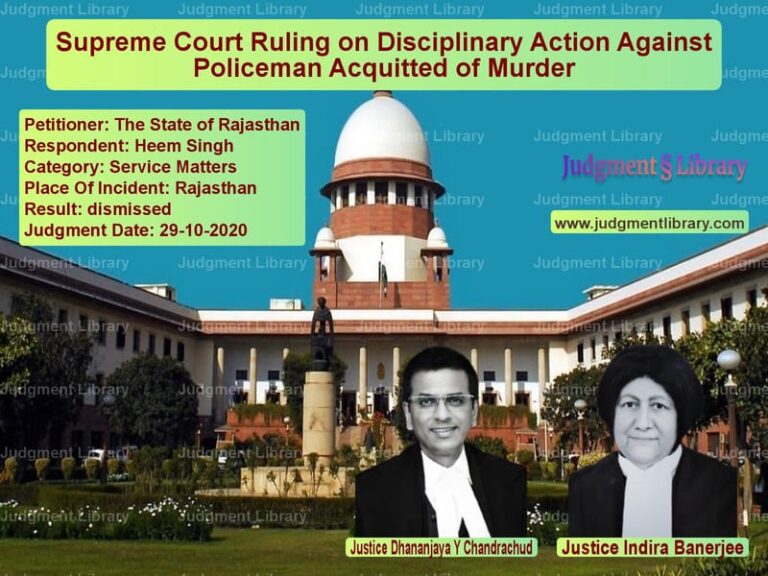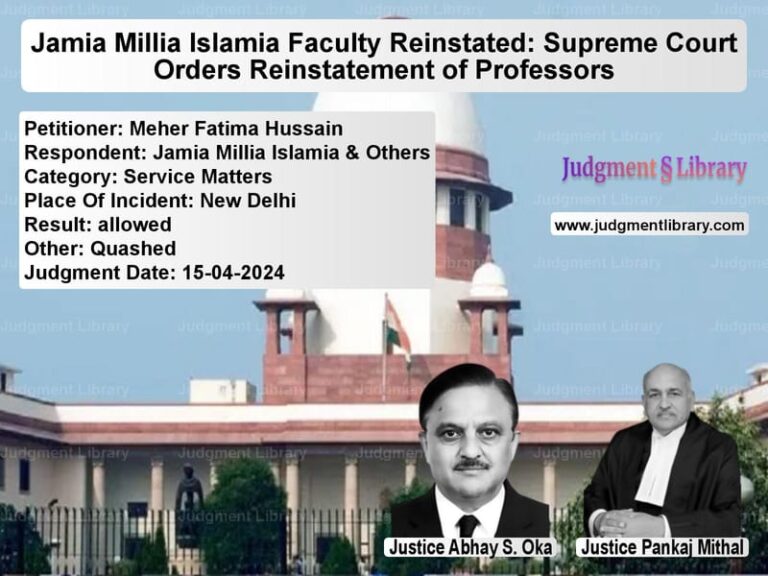Fair Price Shop Vacancy Cancellation: Legal Implications and Judicial Review
The case at hand concerns the cancellation of Fair Price Shop (FPS) vacancies by the State of West Bengal, which resulted in a legal battle involving the principles of legitimate expectation, government policy changes, and statutory obligations. The dispute arose when the state, after initiating a selection process for FPS dealers, decided to cancel the vacancies due to changes brought about by the National Food Security Act, 2013. The respondent, Gitashree Dutta (Dey), who was the top-ranked candidate in the selection process, challenged this decision before the Calcutta High Court and obtained a favorable ruling. The state, dissatisfied with the ruling, appealed before the Supreme Court.
This judgment delves into the intricacies of public policy, the doctrine of legitimate expectation, and the power of the state to alter decisions in view of statutory mandates. The Supreme Court’s decision ultimately shaped the legal contours regarding government policy changes and their impact on ongoing selection processes.
Background of the Case
Fair Price Shops play a crucial role in the public distribution system, ensuring that essential commodities reach beneficiaries at subsidized rates. The selection of FPS dealers follows a structured process where candidates apply, and the government evaluates them based on predetermined criteria. The respondent, Gitashree Dutta (Dey), applied for an FPS license in response to a notification issued by the state. Following a rigorous selection process, she was recommended as the top candidate for appointment.
However, before the final appointment order could be issued, the State of West Bengal decided to cancel the vacancies. The justification provided was the implementation of the National Food Security Act, 2013, which restructured the public distribution system and resulted in a reduction in the number of beneficiaries. Consequently, the state deemed it necessary to reassess the FPS requirements, leading to the cancellation of vacancies.
Petitioner’s Arguments
The State of West Bengal, in its appeal, presented several arguments to justify the cancellation of FPS vacancies:
- The government has the authority to alter its policies in response to statutory changes. The implementation of the National Food Security Act, 2013 required a reassessment of the number of FPS dealerships, making it necessary to cancel certain vacancies.
- The respondent had not acquired a vested right to the FPS dealership as the selection process had not culminated in an appointment order. Until the appointment is finalized, the government retains the discretion to withdraw the vacancies.
- The cancellation was done in the interest of better governance and efficient management of the public distribution system. The government’s actions were neither arbitrary nor in violation of any legal principles.
- The concept of legitimate expectation cannot override a statutory mandate. Even if the respondent had an expectation of appointment, it could not supersede the government’s right to reassess policies in line with legal frameworks.
Respondent’s Arguments
The respondent, Gitashree Dutta (Dey), countered the petitioner’s arguments with the following points:
- She had successfully completed the selection process and was declared the first-priority candidate. This created a legitimate expectation that she would be appointed as an FPS dealer.
- The cancellation of vacancies, after the selection process had reached an advanced stage, was arbitrary and unfair. The government should not have issued the selection notification if it intended to cancel the vacancies later.
- Even if the National Food Security Act, 2013 altered the public distribution system, the state had other means to accommodate the changes rather than canceling the FPS vacancies entirely.
- The High Court correctly ruled in her favor, recognizing that the cancellation violated principles of fairness and natural justice.
Judicial Observations
The Supreme Court, while deliberating on the matter, examined various legal principles, including legitimate expectation, estoppel, and the power of the state to alter policies. The key observations made by the Court were:
Read also: https://judgmentlibrary.com/supreme-court-upholds-landowners-rights-in-delhi-compensation-dispute/
- The doctrine of legitimate expectation, while significant, cannot be used to challenge a decision that is in furtherance of a statutory requirement. The National Food Security Act, 2013 was enacted to reform the public distribution system, and the state had a duty to align its policies with the new law.
- The government has the discretion to reassess its policies based on changing circumstances. If a statutory mandate requires the government to reconsider FPS dealerships, then such reconsideration is legally valid.
- There is no estoppel against a statute. Even if the respondent was initially declared the first-priority candidate, the final decision regarding FPS appointments lies within the government’s purview, especially when statutory changes are involved.
- The government’s decision was not arbitrary. It was based on a rational policy framework and aimed at optimizing the public distribution system under the new law.
Final Judgment
After considering the arguments and legal principles, the Supreme Court ruled in favor of the State of West Bengal. The Court set aside the High Court’s judgment and upheld the cancellation of FPS vacancies. The key aspects of the ruling were:
- The state had the legal right to cancel FPS vacancies in light of the National Food Security Act, 2013.
- The respondent did not have a vested right to the FPS dealership, as the selection process had not been finalized with an appointment order.
- The government’s actions were not arbitrary but based on legitimate policy considerations.
Thus, the appeal was allowed, and the respondent’s claim was dismissed.
Petitioner Name: The State of West Bengal & Ors..Respondent Name: Gitashree Dutta (Dey).Judgment By: Justice S. Abdul Nazeer, Justice Vikram Nath.Place Of Incident: West Bengal.Judgment Date: 20-04-2022.
Don’t miss out on the full details! Download the complete judgment in PDF format below and gain valuable insights instantly!
Download Judgment: the-state-of-west-be-vs-gitashree-dutta-(dey-supreme-court-of-india-judgment-dated-20-04-2022.pdf
Directly Download Judgment: Directly download this Judgment
See all petitions in Contract Disputes
See all petitions in Public Interest Litigation
See all petitions in Judgment by S. Abdul Nazeer
See all petitions in Judgment by Vikram Nath
See all petitions in allowed
See all petitions in supreme court of India judgments April 2022
See all petitions in 2022 judgments
See all posts in Civil Cases Category
See all allowed petitions in Civil Cases Category
See all Dismissed petitions in Civil Cases Category
See all partially allowed petitions in Civil Cases Category


